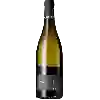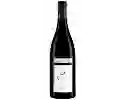
Domaine le VanNans Rosé
In the mouth this pink wine is a powerful.
This wine generally goes well with pork, poultry or rich fish (salmon, tuna etc).
Taste structure of the Nans Rosé from the Domaine le Van
Light | Bold | |
Dry | Sweet | |
Soft | Acidic |
In the mouth the Nans Rosé of Domaine le Van in the region of Rhone Valley is a powerful.
Food and wine pairings with Nans Rosé
Pairings that work perfectly with Nans Rosé
Original food and wine pairings with Nans Rosé
The Nans Rosé of Domaine le Van matches generally quite well with dishes of pork, rich fish (salmon, tuna etc) or shellfish such as recipes of simple pork roast, sardines moroccan style or monkfish tail with coconut milk and curry.
Details and technical informations about Domaine le Van's Nans Rosé.
Discover the grape variety: Cabernet-Cortis
Interspecific cross between Cabernet Sauvignon and Solaris (Merzling x Geisenheim 6493 (Zarya Severa x Muscat Ottonel)) made in 1982 by Norbert Becker of the Freiburg Research Institute in Germany. It has the particularity of having only one gene for resistance to mildew and powdery mildew. It can be found in the Netherlands, Denmark, Belgium, Switzerland, etc., but is still little known in France. Note that Cabernet-Carol has the same parents.
Last vintages of this wine
The best vintages of Nans Rosé from Domaine le Van are 0
Informations about the Domaine le Van
The Domaine le Van is one of of the world's greatest estates. It offers 13 wines for sale in the of Ventoux to come and discover on site or to buy online.
The wine region of Ventoux
The wine region of Ventoux is located in the region of Rhône méridional of Rhone Valley of France. Wineries and vineyards like the Domaine Saint Jean du Barroux or the Château Unang produce mainly wines red, white and pink. The most planted grape varieties in the region of Ventoux are Mourvèdre, Clairette and Roussanne, they are then used in wines in blends or as a single variety. On the nose of Ventoux often reveals types of flavors of cherry, gooseberry or anise and sometimes also flavors of eucalyptus, tropical or pineapple.
The wine region of Rhone Valley
The Rhone Valley is a key wine-producing region in Southeastern France. It follows the North-south course of the Rhône for nearly 240 km, from Lyon to the Rhône delta (Bouches-du-Rhône), near the Mediterranean coast. The Length of the valley means that Rhône wines are the product of a wide variety of soil types and mesoclimates. The viticultural areas of the region cover such a distance that there is a widely accepted division between its northern and southern parts.
The word of the wine: Game
A family of animal aromas reminiscent of venison and present in certain old red wines. See venison.














